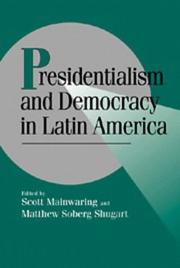| Listing 1 - 2 of 2 |
Sort by
|

ISBN: 0521576148 0521572665 1139174800 Year: 1997 Publisher: New York ; Cambridge ; Melbourne Cambridge University Press
Abstract | Keywords | Export | Availability | Bookmark
 Loading...
Loading...Choose an application
- Reference Manager
- EndNote
- RefWorks (Direct export to RefWorks)
This 1997 book addresses the current debate regarding the liabilities and merits of presidential government. Does presidentialism make it less likely that democratic governments will be able to manage political conflict? With the unprecedented wave of transitions to democracy since the 1970s, this question has been hotly contested in political and intellectual circles all over the globe. The contributors to this volume examine variations among different presidential systems and skeptically view claims that presidentialism has added significantly to the problems of democratic governance and stability.
Executive power --- -Presidents --- -Democracy --- -Political parties --- -Parties, Political --- Party systems, Political --- Political party systems --- Political science --- Divided government --- Intra-party disagreements (Political parties) --- Political conventions --- Self-government --- Equality --- Representative government and representation --- Republics --- Presidency --- Heads of state --- Emergency powers --- Power, Executive --- Presidents --- Implied powers (Constitutional law) --- Separation of powers --- Powers --- Latin America --- Politics and government. --- Pouvoir exécutif --- Pouvoir exécutif --- -#SBIB:328H32 --- Democracy --- Political parties --- Démocratie --- Partis politiques --- Présidents --- Amérique latine --- Politique et gouvernement --- Politics and government --- Executive power - Latin America. --- Presidents - Latin America. --- #SBIB:003.AANKOOP --- #SBIB:324H40 --- #SBIB:328H32 --- Politieke structuren: algemeen --- Instellingen en beleid: Midden en Latijns-Amerika --- Social Sciences --- Political Science
Book
ISBN: 110877556X 1108788238 1108805949 1108478018 1108745415 9781108745413 9781108478014 9781108775564 Year: 2020 Publisher: Cambridge: Cambridge university press,
Abstract | Keywords | Export | Availability | Bookmark
 Loading...
Loading...Choose an application
- Reference Manager
- EndNote
- RefWorks (Direct export to RefWorks)
"How do formal institutions affect the extent to which democracies adopt policies that reflect the preferences of their citizens? Based on a chain of representation model in which electoral rules and policymaking powers link citizens, politicians, and policies, this book reveals the conditions under which citizen preferences and implemented policies diverge. Comparative quantitative analyses encompassing eighteen Latin American countries show that presidential democracies vary greatly in the degree to which they demonstrate responsiveness to their electorates. Often, individual presidents with strong legislative powers have prompted policy changes that are unrepresentative of voter preferences. Other times, their interactions with legislatures result in more representative policies. Grounded in clear theory and thorough empirics, this study shows how rules can introduce dissonance between voters and politicians, but also how they can potentially reduce it. This is an excellent resource for scholars and graduate students interested in comparative politics, institutional design, economic policy, and Latin American studies"--
Representative government and representation --- Political participation --- Public opinion --- Presidents --- Executive power --- Political planning --- Policy sciences --- Policy-making --- Policymaking --- Public policy management --- Planning in politics --- Public policy --- Planning --- Politics, Practical --- Public administration --- Emergency powers --- Power, Executive --- Political science --- Implied powers (Constitutional law) --- Separation of powers --- Presidency --- Heads of state --- Opinion, Public --- Perception, Public --- Popular opinion --- Public perception --- Public perceptions --- Judgment --- Social psychology --- Attitude (Psychology) --- Focus groups --- Reputation --- Powers --- Latin America --- Politics and government. --- Representative government and representation - Latin America --- Political participation - Latin America --- Public opinion - Latin America --- Presidents - Latin America --- Executive power - Latin America --- Political planning - Latin America --- Policy sciences - Latin America --- Latin America - Politics and government
| Listing 1 - 2 of 2 |
Sort by
|

 Search
Search Feedback
Feedback About UniCat
About UniCat  Help
Help News
News